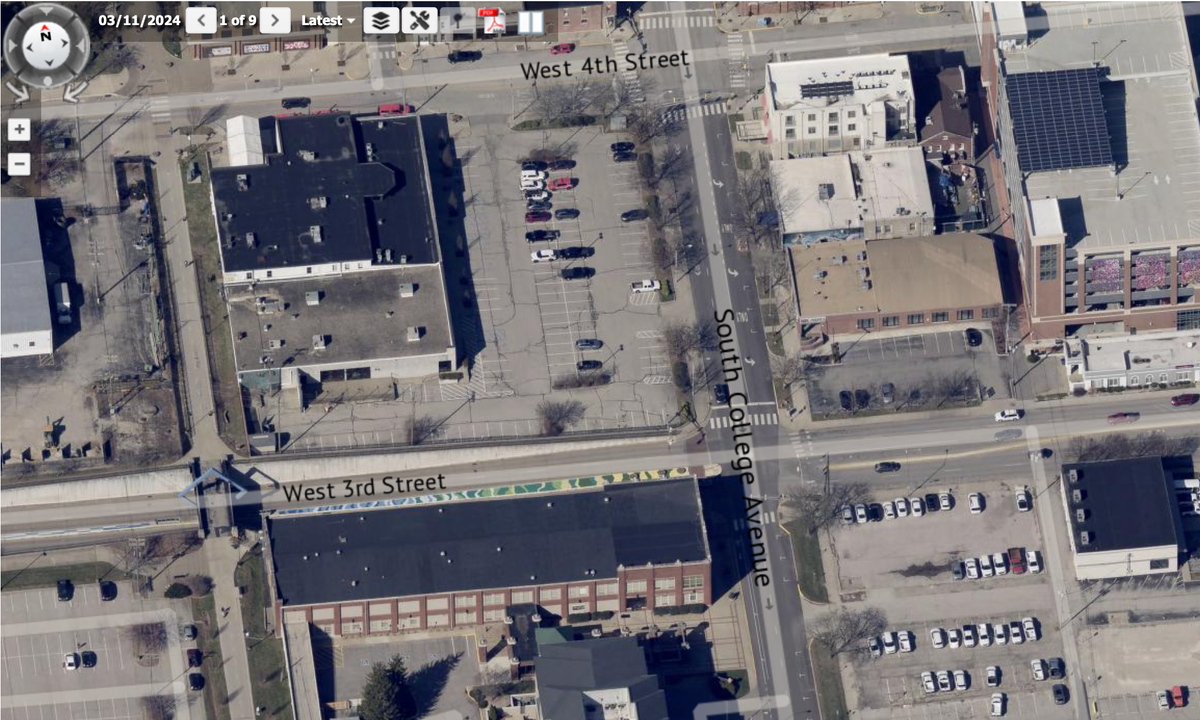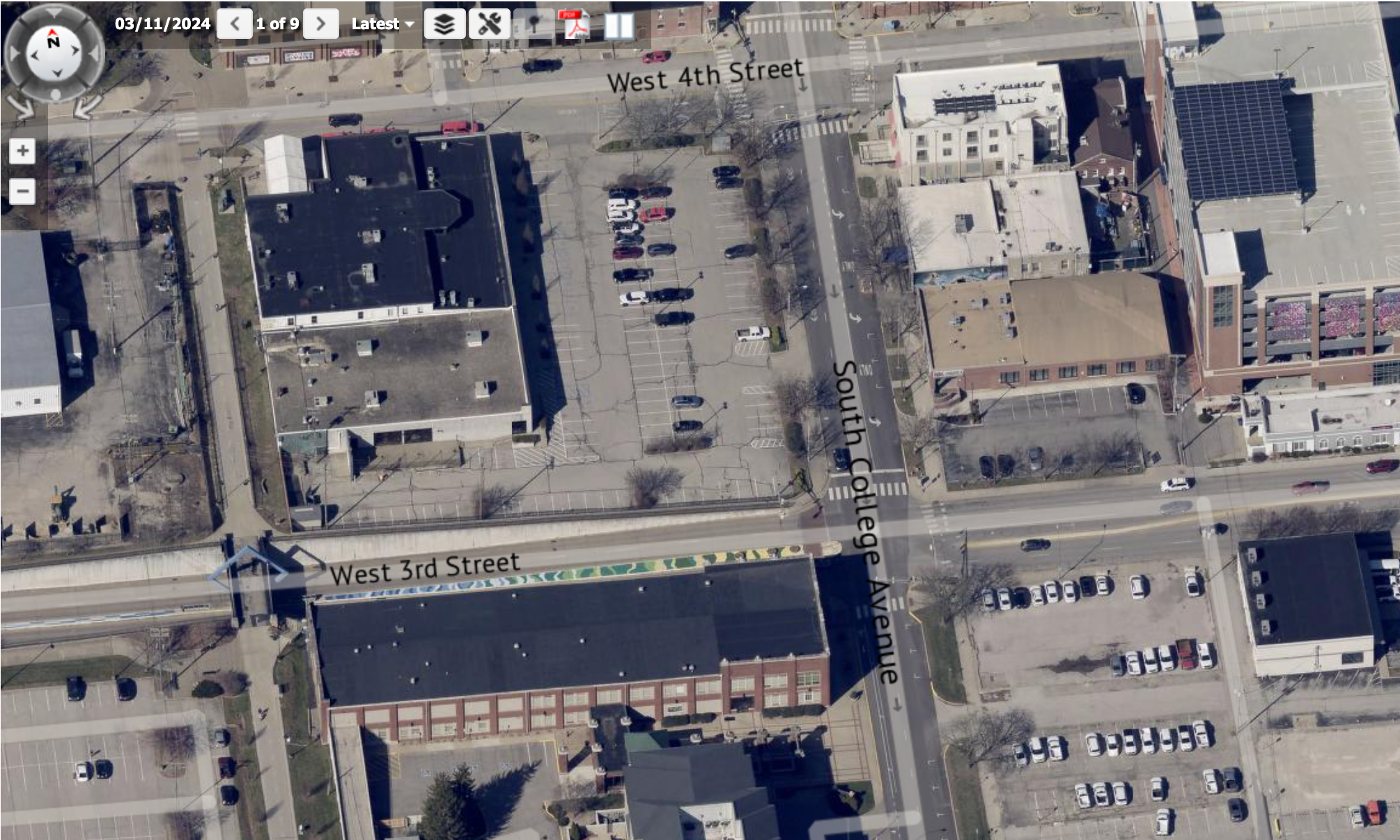Bloomington might donate $7M site for convention center host hotel after year-long stalemate
Bloomington’s RDC might now donate the $7M former Bunger & Robertson site to revive stalled talks with Dora Hospitality on a host hotel for the convention center expansion. The proposal reverses Bloomington mayor Kerry Thomson's prior position.


Bloomington’s redevelopment commission (RDC) might now wind up donating at least $7 million worth of downtown real estate to the convention center hotel project.
That news comes after a gloomy report last Wednesday from the RDC to Monroe County’s capital improvement board (CIB) about the prospects for a potential real estate deal for the development of a hotel that would support the convention center expansion.
The deal would be with Dora Hospitality for the property at 4th Street and College Avenue, which is commonly called the former Bunger & Robertson site. It's north of the existing convention center.
Based on remarks from RDC executive director Anna Killion-Hanson and RDC member John West at the CIB’s Wednesday meeting, it sounded like the negotiations for the property had completely stalled. Killion-Hanson said, “Despite offering a significant contribution, a very large funding gap does still exist."
The negotiations have been going on for more than a year, since the CIB chose Dora as its preferred hotelier. The lack of visible progress on the host hotel land deal, even as structural steel goes up for the convention center expansion, prompted the CIB to give the RDC and Dora a Dec. 17 deadline.
Even if the RDC’s discussion of the real estate negotiations had been going on in executive sessions, closed to the public, the city’s price was believed to be a sticking point. Under Indiana’s Open Door Law, real estate transitions are one of the topics on which a governing agency can hold an executive session.
A potential deal got a glimmer of hope on the Wednesday before Thanksgiving, with the release of the meeting information packet for the RDC’s regular Monday (Dec. 1) meeting. On the meeting agenda for the RDC is a resolution that affirms the RDC’s support for the convention center expansion project. A key “resolved” clause of the resolution says that the land at 4th Street and College Avenue (College Square) will be made available to the host hotel project at no cost. Here’s how that resolved clause reads:
The Bloomington Redevelopment Commission hereby provides notice of its further commitment to the host hotel project by making the real estate at College Square necessary for the host hotel available, in some form, to the host hotel project at no or nominal costs to the project.
That’s a significant change from Bloomington mayor Kerry Thomson’s administration’s previous position, which was that the city needed to see reimbursement from the roughly $7 million that was paid for the real estate. Thomson said the proceeds from the property need to be invested in a way that helps address the affordable housing needs in the city.
The idea that the land could essentially be donated is also at odds with the Bloomington city council’s formal position on the topic, which was expressed in a letter to the RDC dated May 6, 2024:
Any land owned by the RDC that may be considered for an expanded convention center site must be purchased by the CIB (or other entity, for example, a hotelier) for, at minimum, the price the RDC paid to acquire the property. Specifically, in the case of the RDC property west of College Avenue and between Third and Fourth Streets (sometimes referred to as the former Bunger & Robertson property), this would be a minimum purchase price of $6,895,000. The RDC may also want to consider asking for a higher purchase price if an appraisal indicates a fair market value above $6,895,000.
The land was acquired by the RDC, using TIF (tax increment finance) revenue, in two separate transactions—one in 2019 and the other in 2023. The first transaction was a step taken by Bloomington’s then-mayor John Hamilton—an attempt to steer the convention center expansion site preference to the north of the existing facility.
The actual location chosen for the expansion by the CIB was for the real estate east of the existing facility, between College Avenue and Walnut Street south of 3rd Street. That land was owned by the Monroe County government. CIB opted for that location because of the $7 million price asked by Bloomington’s RDC, compared to the free land offered by Monroe County.
But it’s not certain that the RDC’s Monday resolution about donating the land to the hotel project, if it passes, would necessarily clear the way to a deal. That’s because the $7 million price tag does not sound like it was the only sticking point in the year-long negotiations—given the discussion at the CIB meeting last Wednesday.
On Wednesday, CIB president John Whikehart talked about the fact that the CIB does not have cash incentives to offer to Dora. But Whikehart indicated that some of the items included in the RFP (request for proposals) for the hotel project were not absolutely essential.
One of those elements is a skywalk across 3rd Street connecting the hotel to the existing convention center—an element that Dora included in some preliminary concept drawings. A rooftop bar and underground parking were also not essential, Whikehart said. By eliminating those elements, the project could potentially save $15 million, Whikehart said on Wednesday.
The potential contribution by the RDC of $7 million in real estate, on top of $15 million in cost savings through the CIB’s reduced project scope, could point to a funding gap for Dora that is at least $22 million. The RDC has also committed a total of $400,000, for soil borings and for creation of schematics, as a part of the negotiation process.
One technically conceivable option for additional public support of the project would be a tax abatement. But given that the city council is already on record opposing a public subsidy in the form of the former Bunger & Robertson property, the approval of a tax abatement, in addition to the land donation, appears to be an unlikely political scenario.




Comments ()